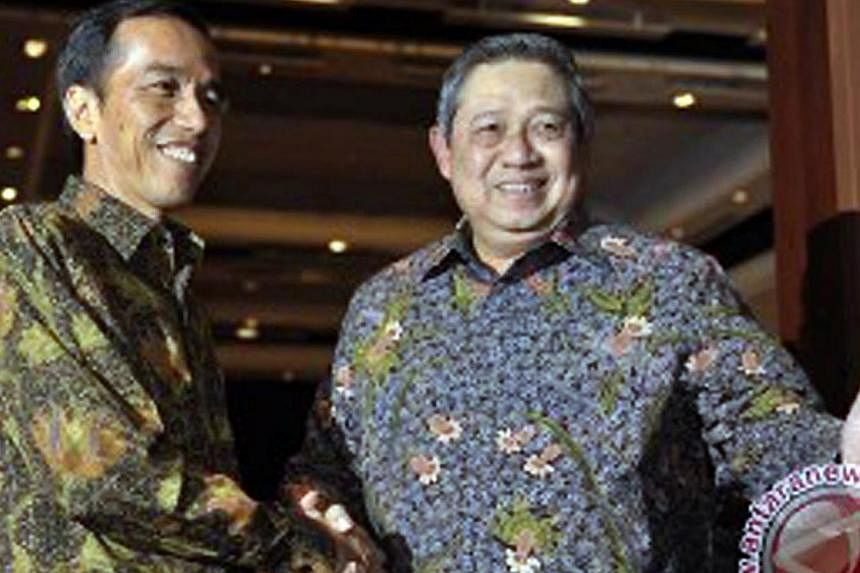JAKARTA (Jakarta Post/Asia News Network) - After 100 days in power, President Joko "Jokowi" Widodo and his Cabinet have been given the thumbs-down from his predecessor, Dr Susilo Bambang Yudhoyono, activists and political analysts.
They say that Jokowi, who was sworn in as President on Oct 20, has yet to enact tough policies on law enforcement, corruption and bureaucratic reform, and that Jokowi remains in thrall to his political benefactors.
"I don't know what the government has done after 100 days in power. Do you? What I am seeing is that conflict in certain fields is mounting. But let's give Jokowi a chance to solve the problem," Dr Yudhoyono told The Jakarta Post on Wednesday.
Mr Pramono Anung Wibowo and Mr Effendi Simbolon, two senior figures in the Indonesian Democratic Party of Struggle (PDI-P), winner of last April's legislative elections and the party that backed Jokowi in the July 2014 presidential election, admitted that the President and his government had yet to see significant progress, saying that Jokowi had been weak from the outset in choosing his Cabinet.
"Jokowi began by recruiting several unqualified ministers into his Cabinet, raising fuel prices without any anticipation of the rise in world oil prices and distributing Indonesia Health Cards (KIS) with the distribution of Prosperous Indonesia Cards [KIS]and Indonesia Smart Cards (KIP) in compensation to low-income people," said Mr Effendi.
He added that Jokowi, who has cultivated a "man of the people" image, had failed to show strong leadership in handling the mounting conflict between the police and the Corruption Eradication Commission (KPK).
Mr Pramono concurred and said Jokowi's "blusukan" (impromptu local visits) programme had yet to change society.
"He has make a series of 'blusukan' to Papua, Kalimantan and Sumatra but many major problems in those regions have remained unresolved," he complained.
Mr Ade Irawan, coordinator of Indonesian Corruption Watch (ICW), said he was disappointed with Jokowi's failure to fulfill his campaign promise to intensify the war on corruption.
"The President has no clear policy on corruption eradication as indicated by his decision to nominate Commander General Budi Gunawan as police chief candidate even though (Budi) had been named a graft suspect by the KPK," Mr Ade said, adding that Jokowi also gave the impression to the public that he didn't have the courage to take tough measures in bridging the widening police-KPK rift.
Mr Nico Harjanto, political analyst at the Populi Centre, said the accumulating problems faced by the current government had a lot to do with the President's inability to say "no" to his supporting parties.
"Jokowi is apparently running his government under the shadows of his supporting parties. This is indicated by the President's decision to appoint the new attorney general and the nomination of Budi Gunawan," he said.
Jokowi turned a deaf ear to public protests when he appointed Nasdem Party politician Prasetyo as attorney-general and when he declined to drop the nomination of Budi.
Villages, Disadvantaged Regions and Transmigration Minister Marwan Djaffar said the absence of significant progress had a lot to do with the slow bureaucratic engine as shown by the slow formation of portfolios in the ministries and non-ministerial state institutions.
"The current government should speed up the formation of portfolios and bureaucratic reform because no significant progress will be achieved without full support from the bureaucracy," he said during a recent visit to The Jakarta Post.
Mr Arie Sudjito, political analyst at Gadjah Mada University in Yogyakarta, said despite the problems, Jokowi had made some progress in launching the "mental revolution" by instructing his Cabinet to work harder for the sake of the people.
"This is a good start in carrying out development programs, including the war on corruption," Mr Arie said, adding that Jokowi had showed his capacity as a statesman by declining to interfere in the KPK and the National Police's respective investigations into the Bambang and Budi cases.
Ms Rieke Diyah Pitaloka, another PDI-P politician, said the existing and emerging problems would be opportunities for Jokowi and his government to make significant progress in the coming years.
"One hundred days are too short for Jokowi and his government to make significant changes. But with the existing problems, the President and his Cabinet will have enough evaluation materials to enhance solidity and coordination to make major achievements in the future," she claimed.

